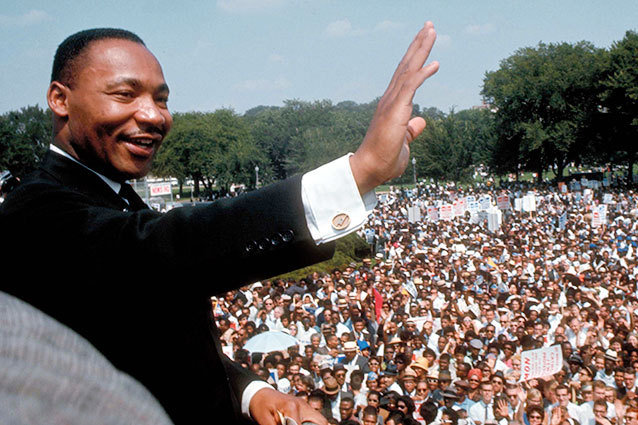 Francis Miller/Time Life Pictures/Getty Images
Francis Miller/Time Life Pictures/Getty Images
Wednesday marks half a century since Martin Luther King delivered his prophetic “I Have a Dream” speech at the base of the Lincoln Memorial in our nation’s capital. Viewed deservedly as one of the most important events in American history, let alone the civil rights movement, the partially improvised oration helped to usher in a future of liberty and equality for men and women of all races. Without King, we might well not have the society and opportunities we know today. We have countless film and television programs that sanctify the toils of the game changing doctor and reverend. The most notable example, perhaps, is the publicly beloved Forrest Gump, which offers a snippet of footage of King’s “I Have a Dream” speech before fading to black with an ominous gunshot.
Solemn, reverent, almost holy portrayals such as Forrest Gump‘s are important in the maintenance of King’s legacy as something that should never be taken for granted. But to view the speech, as well as King’s life, work, and eventual assassination in 1968 with such distance — as a historical triumph alone — would be limiting. To those experiencing the events of King’s rise, influence, and death as they occurred were likely to have highly personal relationships with each. This idea is explored in an episode of Mad Men from Season 6:
Mad Men
The ordinarily nefarious Pete Campbell finds his humanity in his appreciation of King, in his empathy for him hours after his assassination. But Harry Crane is not meant to be made entirely a devil, here. In Harry’s mind, he’s a man who believes himself responsible for the same things he was the day prior, not allowing himself to feel the daunting ramifications of King’s death in the face of his day to day.
It is important to recognize the difficulty that such a moment as finding out about King’s murder might have brought upon any American at the time. The melding of politics, ideologies, and personal feelings and responsibilities is sure to result in some unabiding conflict. Forty-five years after King’s assassination, we are able to look at the event as a point in history. But it was, as illustrated quite adeptly in Mad Man, at one time, an experience.
Even more innovative, and controversial, is the way in which The Boondocks handled the material of King. Creator Aaron McGruder “revived” the fallen King in an alternate timeline, only to have him express disappointment with the state our society has taken (the below episode is not only NSFW, it is likely to be deemed offensive by many):
The Boondocks
Whether you agree with McGruder’s approach or not, it is necessary to thinking about King’s legacy in regards to our society today. Yes, “I Have a Dream” was spoken 50 years ago. But does it no longer apply today? Have we reached or exceeded the speaker’s hopes, or have we fallen short? Is this the future to which the hopeful men and women of the era aspired?
We should look back on Martin Luther King with the respect and honor he has earned, swelling with gratitude over all of the changes he imparted upon our country. But asking questions, dissecting possibilities, exploring new vantage points of situations and ideas — these are all just as important. And probably worthy of the attention of better men than Pete Campbell.
More:
‘Mad Men’ Recap: Fathers, Sons, and MLK
‘The Butler’ Tells an Important Story
Celebrate History with Our Favorite Google Doodles
Follow @Michael Arbeiter
| Follow @Hollywood_com
From Our Partners Battle of the Bikini Bodies (Celebuzz)
Battle of the Bikini Bodies (Celebuzz) Complete Guide to Strippers in Movies and TV (Vh1)
Complete Guide to Strippers in Movies and TV (Vh1)


